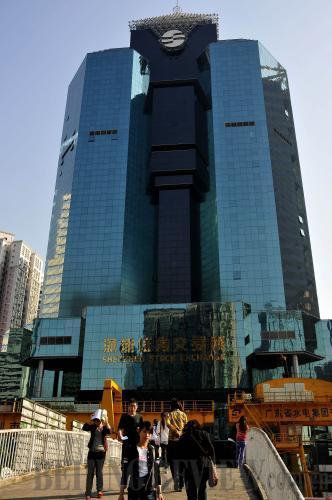|
 |
|
CHINA'S NASDAQ: The country's growth enterprise board, ChiNext, part of the Shenzhen Stock Exchange, accommodates more than 130 companies (YUAN SHUILING) |
When launched last October, China's growth enterprise board, called ChiNext, listed only 28 companies. Now, it accommodates more than 130 companies, and has raised more than 99.24 billion yuan ($14.81 billion) in capital.
China's capital markets include the main board, the Shanghai Stock Exchange, and the small and medium-sized enterprise board and the growth enterprise board, which are both parts of the Shenzhen Stock Exchange (SZSE).
Zhang Sining, Director of the Department of Public Offering Supervision of the Growth Enterprise Board of the China Securities Regulatory Committee (CSRC), said ChiNext, positioned to support development of innovation-oriented and other growth enterprises, accords with the country's transformation of economic growth pattern and development of strategic emerging industries. In ChiNext's first year, the number of high and new technology companies accounted for 92.31 percent of the total listed.
"ChiNext has gathered many innovation-oriented growth enterprises, opening a new way for the capital market to promote development of strategic emerging industries," Zhang said.
To further develop the growth enterprise board, the CSRC established the first ChiNext expert consultation committee in late October 2010. Chen Dongzheng, President of the SZSE, said the next step will be to continue to promote systematic innovation and perfect the mechanisms suitable for growth enterprises according to the CSRC's guidelines.
The most pressing concern, Chen said, is implanting a delisting mechanism. When ChiNext was launched last year, experts and investors had appealed for a delisting system as a key mechanism to promote the "survival of the fittest" in the capital market. A sound delisting system would not only guide market resources to quality enterprises, but also effectively curb excessive market speculation and violations, and prevent and resolve market risks. Furthermore, it could also improve the overall quality of listed companies.
Promising outlook
ChiNext's performance in the past year has been "satisfactory," said Shang Fulin, Chairman of the CSRC. At the inauguration conference of the expert consultation committee in Shenzhen on October 29, 2010, Shang said ChiNext has been operating stably since opening and that market participants have acted in good order. It is developing as expected in terms of encouraging and guiding social investment, supporting development of innovation-oriented companies and promoting links between financing and industries.
So far, Shang said, ChiNext has improved the financing channels for innovation-oriented small and medium-sized enterprises, accelerated industrial application of science and technology achievements and promoted China's indigenous innovation strategy. Moreover, it is more conducive for promoting and nurturing China's strategic emerging industries.
Most ChiNext-listed companies are from emerging industries including electronic information (which makes up 33.08 percent of those listed), bio-pharmaceutical (10 percent), new energy (3.08 percent), advanced manufacturing (27.69 percent), new materials (6.92 percent), and energy conservation and environmental protection (4.62 percent). The culture, education and media industries are also represented. And using ChiNext as a jumping point, many more quality companies have stepped onto the innovation-driven fast track.
Shang said, in general, ChiNext-listed companies have maintained solid growth and strong profit capabilities. For the 94 listed companies that issued semi-annual reports, revenues grew 26.11 percent year on year with their profits increasing 22.65 percent. With this kind of results, ChiNext will only continue to attract growth enterprises, which will in turn allure talents and resources to flock to growth enterprises.
Platform for POEs
Hu Jizhi, President of Guosen Securities Co. Ltd., one of the underwriters for ChiNext-listed companies, said the board will provide a platform for private-owned enterprises (POEs) and stimulate China's private economy.
According to SZSE figures, 123 of the 134 ChiNext-listed companies are non-state holding companies, accounting for 94.62 percent of the total.
"Once a POE is listed, it has officially become a public company. This is a radical transformation, to say the least," Hu said. "A large number of non-listed POEs now operate with standards of those listed. This will ultimately help improve the corporate governance of POEs."
Lepu Medical Technology (Beijing) Co. Ltd., one of the first 28 companies listed on ChiNext, now has the biggest market value, with 22.88 billion yuan ($3.41 billion) as of October 29, 2010.
Sun Jianke, Chairman of Lepu Medical Technology, said one of the many changes in his company was in its corporate governance.
"In the past, although we have many shareholders, that number was limited, and coordination between the board of directors and the shareholders' meeting was comparatively easy," Sun said. "But now, as a listed company, we must be responsible for all the shareholders, and even the whole society, so naturally the company has taken steps to improve this governance."
More importantly, after becoming listed, Lepu made breakthroughs in its innovation capacity. Sun said through raising funds on the capital market, the company improved its R&D platforms. Now, the company has seven R&D centers, and one of its products is going through patent application procedures in the United States.
|
